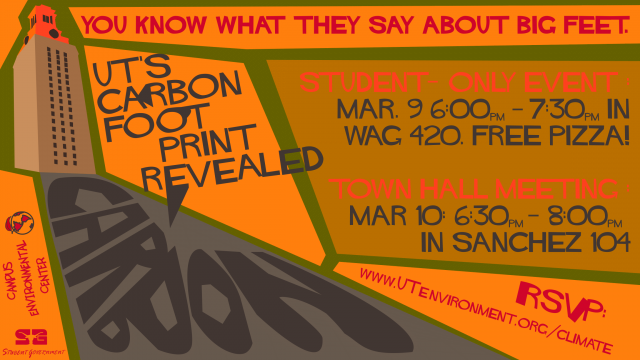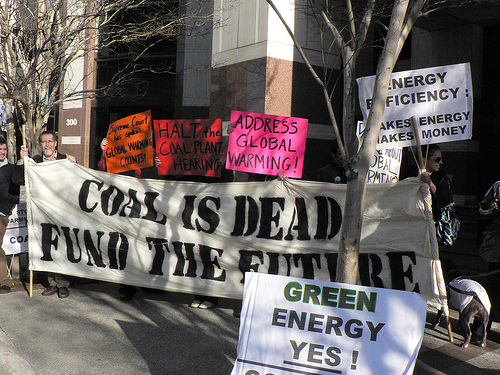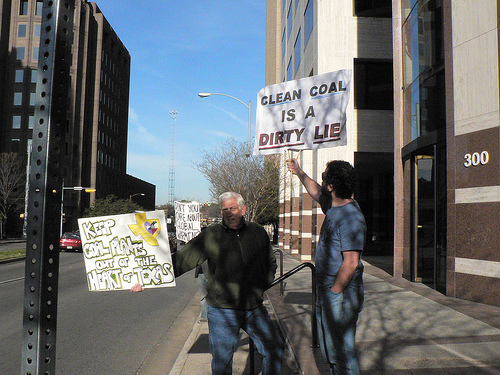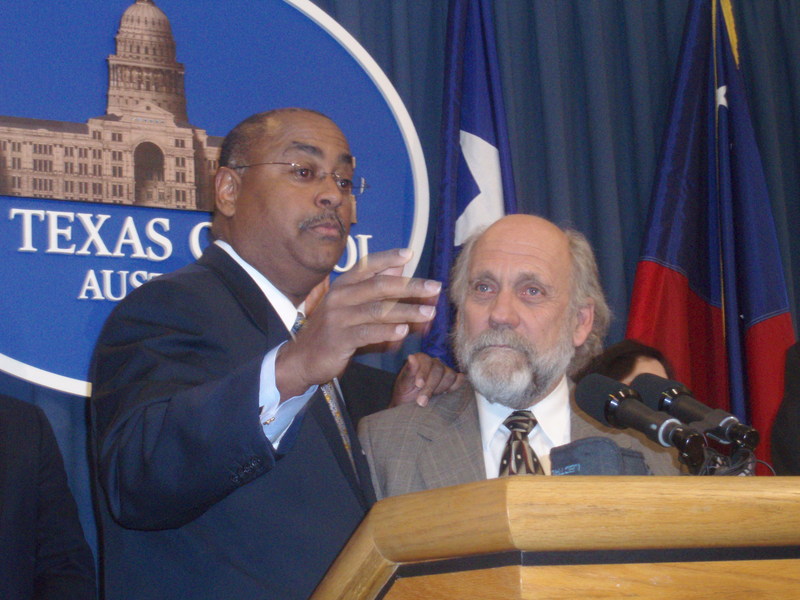According to a Bloomberg article this morning, San Antonio Representative Charlie Gonzalez has joined
a group of Democrats on the House Energy and Commerce Committee (who) want to give utilities free permits for all their existing carbon emissions, according to people familiar with a plan sent to the committee’s chairman.
The article continues:
Representative Rick Boucher of Virginia sent the four-page list of recommendations to Henry Waxman, the committee’s chairman and the author of draft climate-change legislation that some of his fellow Democrats are seeking to temper, said the people, who declined to be identified before the plan is made public. Courtney Lamie, Boucher’s spokeswoman, didn’t respond to e-mail and phone messages.
Waxman’s measure would establish a cap-and-trade system of pollution credits designed to cut carbon dioxide 20 percent from 2005 levels by 2020. He needs to win the support of Boucher and the other Democrats pushing for changes in his plan because no Republicans are likely to vote for it, Representative Gene Green, a Texas Democrat, said yesterday.
“It’s all about the consumer,” said Representative Charles Gonzalez of Texas, whose San Antonio-area district has oil and gas operations. “It’s also the economic interests of a member’s district or region.”
Charlie Gonzalez just doesn’t have his facts straight on this one. If you’re really concerned about consumers, giving away pollution credits for free is about the worst way you can write this bill. Giving away allowances would force customers to pay for industry and utilities’ right to pollute without even cutting carbon emissions. There is a right and a very wrong way to write a good climate change bill, and Charlie is supporting the wrong way.
EPA’s most recent analysis say that giving away pollution credits is “highly regressive”, meaning it hurts low-income families the most. At best, this is a bailout and a free ride for the polluters. At worst it will create windfall profits for huge energy companies at the expense of every lower and middle income family in Texas. However, an auction fixes these problems. EPA continues:
“Assuming that the bulk of the revenues from the program are returned to households, the cap-and-trade policy has a relatively modest impact on U.S. consumers. . . . Returning the revenues in this fashion could make the median household, and those living at lower ends of the income distribution, better off than they would be without the program“
A good climate change bill will create billions of dollars of revenue by charging large polluters for the dangerous pollutants they’ve been emitting for decades. This money could then be returned to taxpayers, particularly low-income households, to protect them from any price increases that energy industries may try to pass through to consumers. Another portion of the money could also be used to pursue aggressive energy efficiency programs, so that citizens can save even more money by using less electricity. Every dollar spent on energy efficiency will then also help reinvigorate local economy by putting people back to work doing energy audits and retrofitting inefficient homes.
Congressman Charlie Gonzalez needs to hear that what consumers really need is energy efficiency, renewable energy, lower electric bills and less pollution — not more industry giveaways. So far, it looks like he’s only heard from the lobbyists for the big polluters. We’ve heard that Congressman Gonzalez will cast a deciding vote on whether Texans will be given the tools to forge a new, green economy, or left unprotected from the worst effects of extreme weather and high energy prices.
Congressman Charlie Gonzalez is the swing vote on this issue. Please pick up the phone and call him. The phone number for his DC office is (202) 225-3236 and his office in San Antonio is (210) 472-6195. You can also email his office from his website
 NEWSFLASH! Carbon Dioxide emissions may represent a threat to public health or welfare.
NEWSFLASH! Carbon Dioxide emissions may represent a threat to public health or welfare. Over the past several months, researchers at the Good Company have been compiling a report to measure our own University of Texas’ emissions. Last week
Over the past several months, researchers at the Good Company have been compiling a report to measure our own University of Texas’ emissions. Last week  For me, one of the most interesting aspects of the report was a measure of the green house gasses emitted by a typical UT student to determine the per student carbon footprint. The report offered two general categories of students.
For me, one of the most interesting aspects of the report was a measure of the green house gasses emitted by a typical UT student to determine the per student carbon footprint. The report offered two general categories of students. 



 Last Friday two administrative law judges refused to hear testimony on the impact of carbon dioxide emissions during the permitting process for the NRG Limestone coal-fired power plant. The contested case hearing for NRG’s air quality permit application will be going on all week long, but testimony on the proposed plant’s contribution to global warming will not be allowed. The judges decided that the TCEQ has adopted clear policies that they would not consider testimony on the issue, even though the Supreme Court ruled in 2007 (
Last Friday two administrative law judges refused to hear testimony on the impact of carbon dioxide emissions during the permitting process for the NRG Limestone coal-fired power plant. The contested case hearing for NRG’s air quality permit application will be going on all week long, but testimony on the proposed plant’s contribution to global warming will not be allowed. The judges decided that the TCEQ has adopted clear policies that they would not consider testimony on the issue, even though the Supreme Court ruled in 2007 ( In protest, local environmentalists gathered for an 8:30 a.m. protest Monday Feb 22 outside the State Office of Administrative Hearings. Groups supporting the protest included: Public Citizen, SEED Coalition, Environment Texas, Clean Water Action, Re- Energize Texas, and the Texas Climate Emergency Campaign.
In protest, local environmentalists gathered for an 8:30 a.m. protest Monday Feb 22 outside the State Office of Administrative Hearings. Groups supporting the protest included: Public Citizen, SEED Coalition, Environment Texas, Clean Water Action, Re- Energize Texas, and the Texas Climate Emergency Campaign.



 Senator Fraser was the first legislator to speak, proclaiming that this would be Texas’ solar session. Chairman of the Business and Commerce Committee, Fraser is well positioned to be an effective solar champion. As such, Fraser was particularly proud to forecast a sunny session for solar power. He joked that there are so many solar bills being filed this session, they are going to have to lay them all out at once and have a “solar day” where they can pick out the best bills and key components of each (this is the second time I’ve heard him say this though, so he may be serious. If so, you better bet I’ll be there with bells on!)
Senator Fraser was the first legislator to speak, proclaiming that this would be Texas’ solar session. Chairman of the Business and Commerce Committee, Fraser is well positioned to be an effective solar champion. As such, Fraser was particularly proud to forecast a sunny session for solar power. He joked that there are so many solar bills being filed this session, they are going to have to lay them all out at once and have a “solar day” where they can pick out the best bills and key components of each (this is the second time I’ve heard him say this though, so he may be serious. If so, you better bet I’ll be there with bells on!) Senator Van de Putte was then called up to champion CPS Energy’s new distributed energy commitment and her own solar in schools bill,
Senator Van de Putte was then called up to champion CPS Energy’s new distributed energy commitment and her own solar in schools bill,  The Texas Observer just ran an article on t
The Texas Observer just ran an article on t

